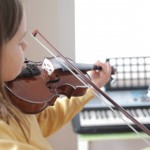 There we were, on our winter break vacation, driving to our hotel after a day of skiing in the Canadian Laurentians.
There we were, on our winter break vacation, driving to our hotel after a day of skiing in the Canadian Laurentians.
“I miss my violin,” Julia sighed, dreamily gazing out at the frozen tundra, not really talking to either my husband nor I. Just thinking out loud.
“Really?” I said, whipping my head around to the back seat.
“Yeah, I should have brought it with me,” she lamented. “I miss it.”
A smile spread across my face. Angels were singing. Julia’s words were nothing less than music to my ears.
Julia is good at violin, and getting better all the time. Is she destined for Lincoln Center? I doubt it. That’s not the point. The fact that she was missing her violin was not about future musical accomplishment. That she was “missing” something was what made this the screech-on-the-brakes moment. It’s not like Julia to make a deep attachment or commitment to something, to anything. She’s innately intelligent so she pretty much gallops by at whatever she does or has to do.
But, showing passion, well, this was new.
Julia uttered this comment on practically her 10th “Gotcha” anniversary, the day we “got her” from Russia. She was eight months old when we adopted her from Siberia a decade ago. Though she was young, Julia had trouble attaching to anyone – or anything – from the moment we brought her home. She never laid claim to a teddy bear or a favorite blanket or toy. She didn’t attach to me or my husband, or to other caretakers. She never made a good friend. She was like a drifter, taking what she needed, passing through.
When we found a name for this – Reactive Attachment Disorder – we made it our life’s work to pull Julia out of her dark tunnel. It took years; it’s never the kind of thing that’s completely healed. By the time she was four, we fully understood the syndrome, which is caused by early separation from a birth mother. Babies who don’t get the nurture and love they deserve subconsciously learn it’s better not to attach to anyone or anything because everything in life, especially love, is ephemeral. A harsh lesson for an infant.
Still, that is what they learn, and these children have a crafty way of keeping their distance, and making sure nothing matters too much. It reminds you of someone who’s been burned by divorce and decides to close their heart.
At ten, Julia is fully attached to my husband and I. We are a solid forever family, the three of us. But our daughter is still reticent about investing her passion elsewhere. There are no posters of Justin Bieber in her room. No friend from school she calls her BFF. No one thing that really, really matters.
Except maybe her violin?
She took it up in fourth grade. She didn’t show any particular talent or interest in the instrument. She never practiced at home, but she coasted in the year-end performance. I thought that was the end of that. Then she went to a sleep-away camp for the performing arts. I had been expecting her to be in one of the theatrical shows but when we got there on visiting day she played violin in a strings concert.
When she returned home, I hired a private music teacher, Karen. Magical things happened. Julia loves Karen. Karen adores Julia. Julia is getting real good on the violin. She practices every day for 30 minutes. She shows commitment. Passion, even. Music has led her to some part of herself that has cracked open resistance to taking chances, and to loving something.
A week ago, I told Julia we were going to her Grandmother’s for Passover. Grandma was expecting 15 people.
“Can I bring my violin and play it for everyone?” she asked.
“Please do,” I replied with a smile.
Tina Traster is an award-winning journalist whose work has appeared in newspapers, magazines, and literary journals such as Audubon, Family Circle,HuffingtonPost.com, the New York Post, and the New York Times, among many others.She is the author of the “Burb Appeal” column in the New York Post. Her essay LoveLearned, about bonding with her adopted Russian daughter, is anthologized in thecollections Living Lessons and Mammas and Pappas. She lives in Valley Cottage, NewYork. Julia is 11.
